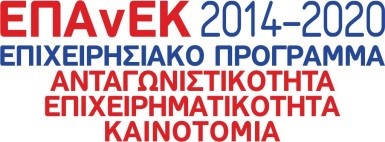The General Secretariat for Research and Innovation is a public service responsible for planning and coordinating implementation of the policy for Research, Technological Development and Innovation (RTDI). It supports activities of the research community and industry through competitive research programmes giving emphasis on both economic growth and social justice. The GSRI supervises research centers and technology bodies that possess and promote the know-how necessary for producing knowledge and boosting innovation. Furthermore, it follows EU and international developments related to RTDI and represents Greece in both European Union institutions and international organizations.
Investing in research and innovation is a key strategic priority for a new development model. A model that is socially, financially and environmentally sustainable based on knowledge and its commercialization through developing high added-value products and services.
The GSRI mandate consists in:
- Designing and promoting a comprehensive, integrated strategy for research and innovation;
- Improving research and innovation performance of Greek enterprises and research and academic institutions;
- Supporting and upgrading Research and Innovation infrastructures in areas of importance for the Greek economy and society;
- Maximizing the impact of the highly qualified human potential in the area of research in order to create new employment opportunities, reverse brain drain and prevent underemployment of scientific personnel;
- Transferring and disseminating innovative technologies to the country’s trade and industry bodies;
- Supervising and funding Greek Research and Technological Institutions;
- Enhancing public awareness on Science, Research and Technology;
- Representing Greece at the relevant European Union and OECD bodies and promoting cooperation with other countries;
- Assessing and evaluating the outcomes and impact of research and innovation actions in the context of an ongoing updating of research policies.
GSRI POLICY AND ACTIONS FOR RESEARCH, TECHNOLOGICAL DEVELOPMENT AND INNOVATION (RTDI)
Development planning for the 2021-2027 programming period is primarily based on the Strategy for Smart Specialization established at the national and regional levels, and directs all RTDI interventions funded by the European Regional Development Fund (ERDF). According to EU regulations, at least 25% of ERDF funds are to be allocated to Cohesion Policy Objective 1 “A smarter Europe”, related to an innovative and smart economic transformation. The new Smart Specialization Strategy will be the basis for new interventions in the field of research and innovation. Additional funding to support RTDI actions is granted by the Recovery and Resilience Fund, the Just Transition Fund and the State budget.
The Smart Specialization Strategy focuses on areas where Greece has already achieved, or could achieve, a competitive advantage. Priorities emerge as a result of the entrepreneurial discovery process aimed at identifying new business opportunities to put into use the newly-produced knowledge and integrate it into value chains. This is achieved through continuous and active consultation of all actors involved in the innovation “ecosystem” (including private enterprises, higher education institutions, research centers, ministries, 1st and 2nd-level local government entities, civil society etc.), with private enterprises and trade and industry bodies at large also playing a central role.
Innovation is further promoted by with new actions and initiatives, including establishment of ELEVATE GREECE National Startup Registry, Innovation Districts in Attica (former CHROPEI warehouses) and Thessaloniki (Thess INTEC Innovation and Technology Center), as well as establishment of Competence Centers, Innovation Clusters and Technology Transfer Offices (TTO) in Greek universities and research centers.
Furthermore, new legislation was adopted introducing an increase of the tax benefit on R&T expenditure for enterprises (from 30% to 100%), the offsetting of pharmaceutical expenditure claw-back with R&D expenditure, as well as incentives to support Business Angels. Finally, a clear, simple and functional framework for spin-off creation is currently under preparation.
Under the 2014-2020 programming period, 209 million EUR were paid, through EPAnEK funds, to Research Infrastructure actions (Multiannual Financial Plan for Research Infrastructures, Strategic Development Action for Research and Technological Bodies, Regional Excellence); in addition, more than 785 million EUR were allocated to state aid actions (including the Single RTDI State Aid Action “Research-Create-Innovate”, Special Actions, International Cooperation Actions, etc.).
Under the national leg of the Public Investment Programme (PIP), national research centers implement Flagship Actions to address the COVID-19 pandemic as well as in the fields of precision medicine, cancer, cardiovascular and neuro-degenerative diseases, climate change and agri-food. At the same time, the Hellenic Foundation for Research and Innovation (HFRI) contributes in a major way to the promotion of national research priorities, by supporting free-choice research, research infrastructures and innovative entrepreneurship.
Innovation stemming from research on the development of a knowledge economy is also supported through the Equifund Innovation Window, an investment platform with a multiplier effect.
Particular emphasis is put on the European perspective with a view to promote synergies with the “Horizon Europe” EU Framework Programme, the new European Research Area and relevant initiatives supporting international cooperation, promoting an innovation mentality and increasing participation of social partners in research institutions.
THE 2021-2027 SMART SPECIALIZATION STRATEGY SUPPORTS THE FOLLOWING EIGHT (8) PRIORITY AREAS:
- Agri-food sector
- Digital Technologies
- Environment and Cyclical Economy
- Sustainable Energy
- Bioscience, Healthcare and Pharmaceuticals
- Materials, Constructions and Manufacturing
- Transport and Logistics
- Tourism, Culture and Creative Industries
RESEARCH AND TECHNOLOGY BODIES
The Research and Technology Institutions supervised by GSRI have contributed significant scientific and research achievements in fields including Medicine and Biomedicine, Information Technology and Telecommunications, the Environment, Physical Science, Astronomy, Humanities and Social Sciences, Marine Research and Transports, as well as in the context of innovative product development and technology.

















